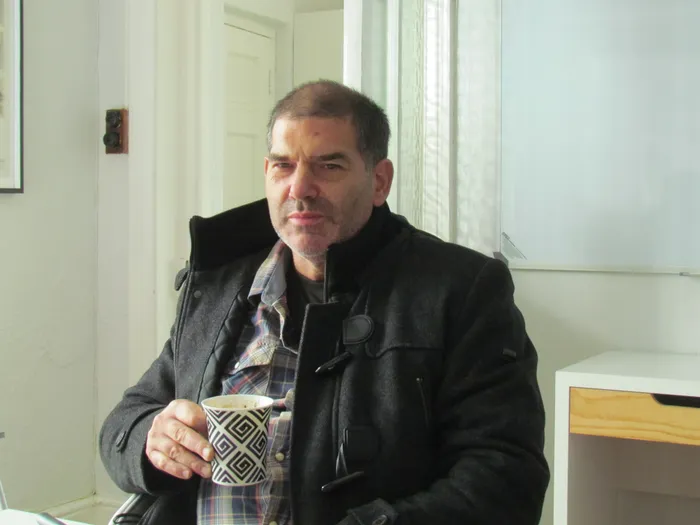Get to know your bin pickers

From homeless to holding a research post at the University of Pretoria, Shaun Shelly sits on several local and international working, technical and expert committees.
Bin pickers are seen as a security risk and a scourge, but they also suffer severe stigma, rejection, criminalisation and dehumanisation, says university researcher Shaun Shelly – and he should know because he used to be one.
After being forced to sell his security business and losing everything he had, Mr Shelly spent about six months living on the streets of Lakeside and Kirstenhof, scratching through bins for things he could sell.
He mostly collected from the discards bin at the back of the old Boardmans at Blue Route Mall. The most valuable thing he found was a picture frame that he got R800 for.
“Other items were mirror tiles, part sets of tableware and the like. Once I found a duvet and cover – brand-new and in the bag – that I sold for R400. I also found an old but functional cellphone in a domestic bin. The couple I met and spoke to at length found a Bang & Olufsen hi-fi outside a house in Constantia. It was fairly old, but in its day one of the best.”
He sold most of what he found to passers-by. Petrol attendants would buy clothes and the picture frame he sold to Cash Converters.
“It was originally a framed mirror, but the mirror was broken, so I took out the mirror bits and sold it as a picture frame,” he said.
He said he had few nasty encounters because he was still articulate, white and fairly presentable. Also, he did not do bin picking regularly or for very long. But he did mix with people who did it regularly.
Mr Shelly ended up in a shack under a tree in Hout Bay where he stayed for almost five years. The roof leaked, the windows were broken, there was no running water and the only toilet was 30m away. Meanwhile, he worked as a security guard for money for food while studying at Stellenbosch University. His course was funded by the Western Cape Department of Social Development, and he graduated cum laude with a postgraduate diploma in addictions care.
He volunteered at NGOs to gain experience. One of these was Hope House in Bergvliet.
That was about 15 years ago. Since then, he helped run a place in Stanford for parolees, served as the advocacy and human-rights manager at TB HIV Care and studied at UCT. He holds a research post in the University of Pretoria’s department of family medicine and sits on several local and international working, technical and expert committees. He lives and works in Wynberg.
Mr Shelly is also the founder and chairman of the South African Network of People Who Use Drugs (SANPUD), and it was at the organisation’s Wynberg office that he described what it was like to be a bin picker.
The issue came to the fore after he wrote a response to a letter by Ursula Schenker (“Bin-picking an intrusion,” Bulletin, June 10) in which she complained about bin pickers.
“I’m not disputing that there are opportunistic criminals who take anything. Some disguise themselves and are a separate group of people, known to the regular bin pickers,” he said.
People should get to know the bin pickers and what they were looking for, he said. “If you understand their situation, there’s a protective factor – they don’t want their business ruined.”
Being a bin picker was a thankless job, he said. They had to get up early to beat other pickers to the bins; they suffered abuse and never knew what they would earn; and they were ripped off and paid below market value for goods they collected.
“And little is being done to provide an equitable value for these goods which would otherwise end up in landfills,” he said.
Mayoral committee member for water and waste, Xanthea Limberg, said bin pickers, or “waste pickers” or “reclaimers”, as the City calls them, were saving 17 400 tons of recyclables from going to landfill in the city per month.
The National Waste Management Strategy charged municipalities and the packaging industry with integrating waste pickers into the recycling value chain in a more formal way. “This clearly sends the message that the waste pickers are here to stay, and the challenge is to find ways to work with them in a way which benefits everyone,” said Ms Limberg.
The number of waste pickers in Cape Town is not known, but, in a recent general study of the industry, 70 of the Cape Town buyback centres reported that they buy recyclables from over 4 450 waste pickers, as part of the 6 450 collectors who sell recyclables to them.
Ms Limberg said that offering practical assistance to waste pickers should be done in a well-planned, participatory way. “Experience elsewhere in South Africa has shown that well-intentioned ‘support trials’, or programmes have, in certain cases, left the waste pickers worse off, and, as a country, we are continually learning from such experiences.”
The City was putting a task team together to look at including waste pickers in the formal waste economy, but it was a long-term process, she said.
Stephanie and Theo, two bin pickers who spoke to the Bulletin but were only prepared to give their first names, said they looked for clothes and shoes they could sell to make a living. Stephanie said she also collected returnable plastic bottles.
Mr Shelly suggests sorting waste and putting recyclables in different colour bags; leaving still-edible food on the top layer in a clear plastic bag; and greeting bin pickers, asking their names and thanking them for keeping waste out of municipal landfills.
